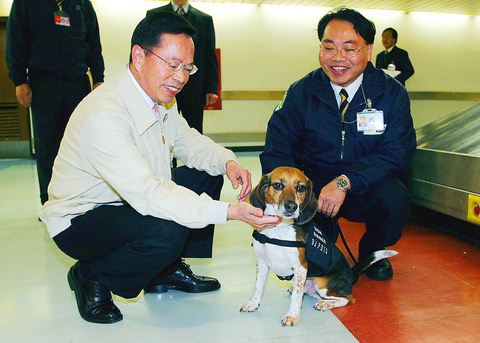The Council of Agriculture will adopt a carrot and stick approach in an effort to prevent pork from pigs that are sick or have died before reaching slaughterhouses from entering the market.
Lee Chin-lung (李金龍), chairman of the Cabinet-level council, made the remarks during a visit to Chiang Kai-shek International Airport yesterday to inspect the work of quarantine officers and sniffer dogs during the Lunar New Year holiday.

PHOTO: CNA
Amid public concern that a large amount of pork from pigs that were sick or had died before reaching abattoirs has been sold by unscrupulous money-hungry criminal farmers in local meat markets, the council is studying ways to manage the problem at the grassroots level, Lee said.
The measures being studied include educating pig raisers on how to handle dead pigs properly and providing incentives to persuade them to send sick or dead pigs to plants that produce organic fertilizer, Lee said.
The council also plans to launch a campaign warning pig farmers not to sell their dead or sick pigs to meat markets so as not to undermine the sale of pork in the hope that they will follow government policy.
In addition, the council is studying measures to confiscate the assets of those who make pork products from sick and dead pigs, Lee said.
Last Sunday, Premier Frank Hsieh (
Hsieh said the government would do whatsoever it can to punish those breaking the law.
"We want to seize their assets and make them so broke that they don't dare to do it again," he said.
Lee yesterday also took the opportunity to urge the public not to bring any fresh fruit or meat products into Taiwan, especially in light of the launch of cross-strait charter flights on Jan. 29 for the Lunar New Year holiday.
Noting that many Taiwanese are in the habit of bringing agricultural products into Taiwan from China, he said the council's Bureau of Animal and Plant Health Inspection and Quarantine has since Jan. 29 seized 640kg of smuggled agricultural and poultry products.

Alain Robert, known as the "French Spider-Man," praised Alex Honnold as exceptionally well-prepared after the US climber completed a free solo ascent of Taipei 101 yesterday. Robert said Honnold's ascent of the 508m-tall skyscraper in just more than one-and-a-half hours without using safety ropes or equipment was a remarkable achievement. "This is my life," he said in an interview conducted in French, adding that he liked the feeling of being "on the edge of danger." The 63-year-old Frenchman climbed Taipei 101 using ropes in December 2004, taking about four hours to reach the top. On a one-to-10 scale of difficulty, Robert said Taipei 101

Nipah virus infection is to be officially listed as a category 5 notifiable infectious disease in Taiwan in March, while clinical treatment guidelines are being formulated, the Centers for Disease Control (CDC) said yesterday. With Nipah infections being reported in other countries and considering its relatively high fatality rate, the centers on Jan. 16 announced that it would be listed as a notifiable infectious disease to bolster the nation’s systematic early warning system and increase public awareness, the CDC said. Bangladesh reported four fatal cases last year in separate districts, with three linked to raw date palm sap consumption, CDC Epidemic Intelligence

Two Taiwanese prosecutors were questioned by Chinese security personnel at their hotel during a trip to China’s Henan Province this month, the Mainland Affairs Council (MAC) said yesterday. The officers had personal information on the prosecutors, including “when they were assigned to their posts, their work locations and job titles,” MAC Deputy Minister and spokesman Liang Wen-chieh (梁文傑) said. On top of asking about their agencies and positions, the officers also questioned the prosecutors about the Cross-Strait Joint Crime-Fighting and Judicial Mutual Assistance Agreement, a pact that serves as the framework for Taiwan-China cooperation on combating crime and providing judicial assistance, Liang

US climber Alex Honnold left Taiwan this morning a day after completing a free-solo ascent of Taipei 101, a feat that drew cheers from onlookers and gained widespread international attention. Honnold yesterday scaled the 101-story skyscraper without a rope or safety harness. The climb — the highest urban free-solo ascent ever attempted — took just more than 90 minutes and was streamed live on Netflix. It was covered by major international news outlets including CNN, the New York Times, the Guardian and the Wall Street Journal. As Honnold prepared to leave Taiwan today, he attracted a crowd when he and his wife, Sanni,